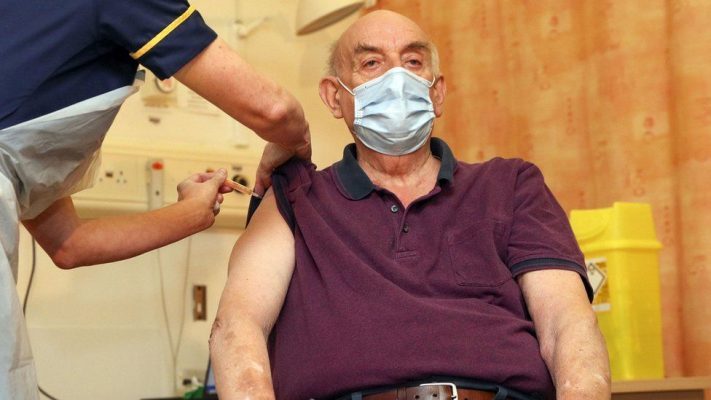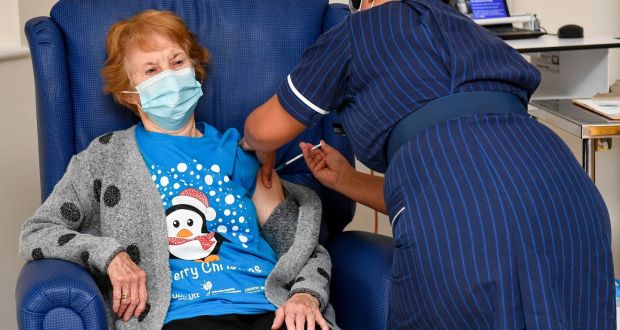
Brian Pinker, 82, received the Oxford-AstraZeneca vaccine at the Churchill Hospital in Oxford on Monday
It was approved for use in the UK on 30 December by the Medicines and Healthcare products Regulatory Agency (MHRA).
The North of Ireland currently has 50,000 doses of the Oxford-AstraZeneca vaccine and people over the age of 80 will be prioritised for vaccination.
Thirty GP practices across the North of Ireland, including a number in Drry, are involved in the rollout.
The Oxford-AstraZeneca vaccine is the second Coronavirus vaccine to have been approved in the UK.
The Pfizer-BioNTech Covid-19 vaccine arrived in the North on December 5, 2020.
It is hoped that about 11,000 men and women aged 80 and over will be vaccinated by the end of the week.
GP Dr Alan Stout said his colleagues are “very optimistic this can be achieved”.
NI’s chief medical officer said the rollout would run alongside the ongoing vaccination programme.
Dr Michael McBride said: “First and foremost we must act to protect those most at risk of severe disease and death.
“The evidence shows that the initial dose of vaccine offers as much as 70% protection against the effects of the virus.
“Providing that level of protection on a large scale will have the greatest impact on reducing mortality and hospitalisations, protecting the health and social care system.
This vaccine was developed by Oxford University and the pharmaceutical company AstraZeneca.
Its rollout consists of two full doses of the vaccine, with the second dose to be given four to 12 weeks after the first.
There are approximately 82,000 people over 80 in the North of Ireland.
About 16,000 have already been vaccinated in care homes with the Pfizer-BioNTech Covid-19 vaccine.
According to the latest NI statistics, for the first time the percentage positive cases in the over 80s is down – an indication the vaccination process is working.
It is understood that if deliveries of the Oxford-AstraZeneca vaccine happen as planned, it is thought that all of those over 80, including GPs and their staff, could be vaccinated within three weeks.
While 50,000 doses have been delivered to the North of Ireland, a further 23,000 vaccines are expected on 19 January while another 68,000 are due on 24 January.

A SHOT IN THE ARM….Maggie Keenan first in world to receive the Pfizer Covid vaccine last month
Dr Stout said as demand grows worldwide for the vaccine, that schedule could easily change.
“The public have to be patient, we have a system and must be allowed to get on with it – it really is ‘don’t call us – we will call you’.”
While some vaccinations will take place in surgeries others will happen in a drive-through system.
Tags:




